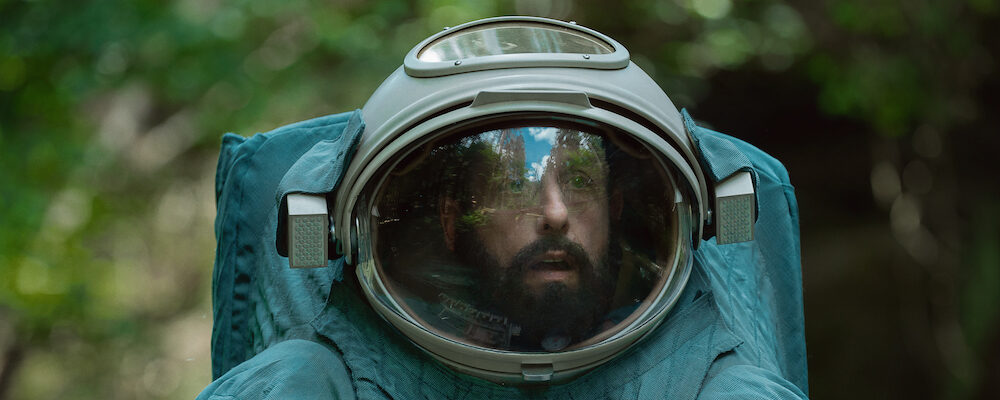‘Spaceman’ Adam Sandler Taps Into His Melancholic Side in Dreamy Sci-Fi Drama
Alci Rengifo
Adam Sandler is readily associated with goofball comedy, but when he gets serious his work takes on an admirably thoughtful quality. If one were to read the concept of “Spaceman” on paper, Sandler would not be the first name to pop into the imagination. But here he is, in a psychologically complex, visually eloquent drama about a cosmonaut pouring out his heart to an arachnid alien. You can not have comedy without tragedy, which is why an actor like Sandler can still surprise us with performances full of genuine heart and angst. And, for a film that doesn’t run long, there are also flashes of genuine awe.
The source of the story is a sci-fi novel by Jaroslav Kalfar, “Spaceman of Bohemia,” which imagines the Czech Republic sending an astronaut on a solo mission. Director Johan Renck sticks to the basics and so we meet cosmonaut Jakub Procházka (Sandler) trying to get close to the Chopra cloud, a mysterious purple particle formation that has appeared in the heavens above Earth. He updates mission control and its head, Commissioner Tuma (Isabella Rossellini), via video updates though he is aware the ship is littered with open and secret cameras. But trouble is brewing when Jakub’s pregnant wife, Lenka (Carey Mulligan), records a message essentially announcing she is leaving him. Tuma decides the cosmonaut can’t know about this development since it might hinder his focus on the mission. Meanwhile, on the ship, Jakub suddenly comes face-to-face with an arachnid entity (voiced by Paul Dano) that turns out to be an alien refugee. Jakub deems him Hanuš and they begin a dialogue that probes into Jakub’s deepest fears, as he doesn’t realize how close he is to losing Lenka.
“Spaceman” works like a small arthouse experiment where even its imperfections can be forgiven for its strengths. Renck directed HBO’s searing limited series “Chernobyl,” one of the best of the last few years. His grainy, dreamlike style fits perfectly with the screenplay by Colby Day, which isn’t aiming to be a standard space adventure. This is a film in the same vein as “The Vast of Night,” where the sci-fi is used to explore deeper themes. The visuals are elegant but never overpower the characters. You can also sense Renck borrowing from films like Andrei Tarkovsky’s “Solaris,” using the loneliness of space as a channel for someone’s loneliness. The production design is wonderfully minimalist and nostalgic, creating a sort of hybrid ‘80s and ‘90s Czech environment where computers, TVs and phones look taken from decades ago. Communism has fallen but now corporate sponsors are the new Big Brother. If Jakub wants to release a cleaning agent to sanitize the ship, he has to recite a pre-written commercial beforehand.
The sly satire is mostly decoration for the real heart of the story. Sander’s cosmonaut is written with a refreshing sense of being flawed. His talks with Hanuš have cute sci-fi moments where he introduces the alien to the delights of human comfort food, but their conversations turn into a mature form of self-reflection. Jakub is losing Lenka because he is so distant, masking his fears with being obsessed with work. Hanuš taps into painful memories revealing how Jakub has missed important, painfully defining moments in the marriage because he was training or in space. In turn, Hanuš wants to comprehend why humans are so selfish and lonely. Renck films memories and flashbacks with a hypnotic melancholy. The score by Max Richter has an electronic sheen familiar to the genre, but doesn’t make it too present. It is also underlying the emotions pouring out or the disorientation of Jakub pondering his life in the coldness of space.
As with “Chernobyl,” Renck also never attempts to use fake accents. Characters speak in normal English. It works because Sandler and Mulligan make the material moving and evocative. For Sandler, this is one of his more unique roles. When he does drama he has wisely chosen colorful leads in “Uncut Gems” or “Hustle.” Jakub belongs to his more experimental turns in “Punch-Drunk Love” and “Click.” While floating with his alien companion, gazing out at the particle cloud coming closer, Sandler’s character has to face how he can love someone yet push them away. The dialogue becomes a moving reflection on those damning faults we don’t notice until it’s too late. Sandler never does one of his trademark outbursts and sustains a quiet, measured tone. Hanuš’ digital design is also given genuine personality, ranging from a curious extraterrestrial to someone disappointed by our capacity to hurt others. A slight flaw is how Mulligan is underused, when her character deserves as much time onscreen as Jakub.
“Spaceman” will probably befuddle some viewers and reviewers. It is a space drama that prefers meditative tones and hallucinatory photography to breakneck action. It features an actor we associate with oddball laughs and family-friendly fare mining some deep depths. When Jakub finally reaches the Chopra cloud, “Spaceman” takes on an even dreamier mood with a genuinely heartfelt goodbye amid zero gravity. It is good to see a studio like Netflix still give something like this a platform. Amid all the ocean of streaming titles, there’s still room for arthouse films that play around with genres, alternative realities and fit it into a parable about love and marriage. It’s the kind of movie some will easily term “weird.” We need more weirdness. “Spaceman” will linger in your memory much longer than the throwaway remakes and sequels we’re bombarded with like an alien invasion.
“Spaceman” begins streaming March 1 on Netflix.

